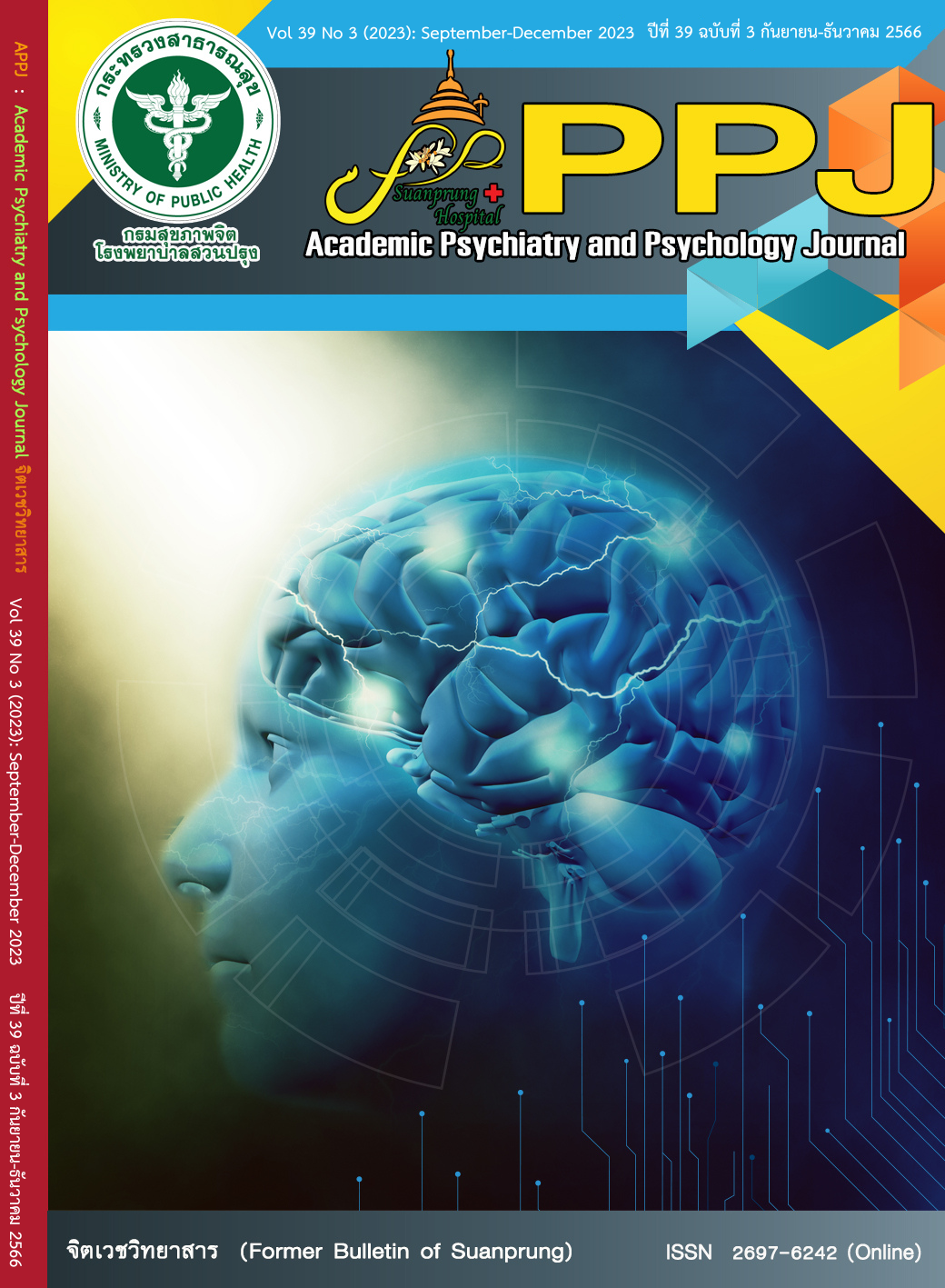Literature Review: Expressive Writing
Main Article Content
Abstract
Introduction: This article reviews the literature on ‘expressive writing’. The objective of this review is to benefit people interested in studying and developing knowledge and application of expressive writing, both psychologists and psychiatrists who want to use it as a therapy tool and non-clinical populations who want to use it as a primary self-care.
Content: Expressive writing is one of the writing therapy methods that highlights the writer’s honest self-reflection. Any content about thoughts, positive feelings, negative feelings, and imagination can be written in a safe space to create and enhance self-awareness, insights, and better self-regulation. Expressive writing can be applied in the therapy process and used as a mental health care and self-development tool, especially for helping people in Asian and collective cultures who do not value emotional disclosure to express themselves without holding back or worrying about negative feedback from others.
Conclusion: Expressive writing is a proven effective therapy tool that helps people explore their thoughts and feelings freely and authentically, resulting in promoting insights and self-awareness. This tool can be applied for many purposes and situations and is also a suitable adjunct in telecounseling services which will gain a greater role in the future.
Article Details

This work is licensed under a Creative Commons Attribution-NonCommercial-NoDerivatives 4.0 International License.
บทความหลังผ่านการปรับแก้จากกองบรรณาธิการแล้ว เป็นลิขสิทธ์ของวารสารจิตเวชวิทยาสาร โรงพยาบาลสวนปรุง กรมสุขภาพจิต กระทรวงสาธารณสุข ห้ามเผยแพร่เพื่อประโยชน์ทางการค้าโดยไม่ได้รับอนุญาต แต่อนุญาตให้เผยแพร่บทความดังกล่าวเพื่อประโยชน์ทางการศึกษาแก่ประชาชนทั่วไป ทั้งนี้กองบรรณาธิการไม่จำเป็นต้องเห็นด้วยกับบทความหรือข้อคิดเห็นใดๆ ที่ปรากฏในวารสารสวนปรุง
References
Tsai W, Lu Q. Culture, emotion suppression and disclosure, and health. Social and Personality Psychology Compass. 2018;12(3):e12373.
Pennebaker JW, Beall SK. Confronting a traumatic event: toward an understanding of inhibition and disease. Journal of abnormal psychology. 1986;95(3):274.
Udomratn, P. (2007). Mental health and psychiatry in Thailand. International Psychiatry, 4(1), 11-14.
Lepore SJ, Smyth JM. The writing cure: An overview. The writing cure: How expressive writing promotes health and emotional well-being. Washington, DC, US: American Psychological Association; 2002. p. 3-14.
Phillips L, Rolfe A. Words that work? Exploring client writing in therapy. Counselling and Psychotherapy Research. 2016;16(3):193-200.
Mordechay DS, Nir B, Eviatar Z. Expressive writing-Who is it good for? Individual differences in the improvement of mental health resulting from expressive writing. Complementary therapies in clinical practice. 2019;37:115-21.
Pennebaker JW. Writing About Emotional Experiences as a Therapeutic Process. Psychological Science. 1997;8(3):162-6.
King LA. The health benefits of writing about life goals. Personality and social psychology bulletin. 2001;27(7):798-807.
King LA, Miner KN. Writing about the perceived benefits of traumatic events: Implications for physical health. Personality and social psychology bulletin. 2000;26(2):220-30.
Adams K. Expressive writing: Foundations of practice: R&L Education; 2013.
Wright J, Chung MC. Mastery or mystery? Therapeutic writing: A review of the literature. British Journal of Guidance & Counselling. 2001;29(3):277-91.
Thompson K, Adams K. Expressive writing: Counseling and healthcare: Rowman & Littlefield; 2015.
Kállay É. Physical and psychological benefits of written emotional expression: Review of meta-analyses and recommendations. European Psychologist. 2015;20(4):242-51.
Baikie KA, Wilhelm K. Emotional and physical health benefits of expressive writing. Advances in psychiatric treatment. 2005;11(5):338-46.
Sloan DM, Marx BP. Taking pen to hand: Evaluating theories underlying the written disclosure paradigm. Clinical psychology: Science and practice. 2004;11(2):121.
Pennebaker JW, Chung CK. Expressive writing: Connections to physical and mental health. 2011.
Greenberg MA, Stone AA. Emotional disclosure about traumas and its relation to health: effects of previous disclosure and trauma severity. Journal of personality and social psychology. 1992;63(1):75.
Pennebaker JW, Seagal JD. Forming a story: The health benefits of narrative. Journal of clinical psychology. 1999;55(10):1243-54.
Frattaroli J. Experimental disclosure and its moderators: a meta-analysis. Psychological bulletin. 2006;132(6):823.
Lepore SJ, Greenberg MA, Bruno M, Smyth JM. Expressive writing and health: Self-regulation of emotion-related experience, physiology, and behavior. The writing cure: How expressive writing promotes health and emotional well-being. Washington, DC, US: American Psychological Association; 2002. p. 99-117.
Knowles ED, Wearing JR, Campos B. Culture and the health benefits of expressive writing. Social Psychological and Personality Science. 2011;2(4):408-15.
Lu Q, Stanton AL. How benefits of expressive writing vary as a function of writing instructions, ethnicity and ambivalence over emotional expression. Psychology and Health. 2010;25(6):669-84.
Lu Q, Gallagher MW, Loh A, Young L. Expressive writing intervention improves quality of life among Chinese-American breast cancer survivors: a randomized controlled trial. Annals of Behavioral Medicine. 2018;52(11):952-62.
Shen L, Yang L, Zhang J, Zhang M. Benefits of expressive writing in reducing test anxiety: A randomized controlled trial in Chinese samples. Plos one. 2018;13(2):e0191779.
Riordan RJ. Scriptotherapy: Therapeutic writing as a counseling adjunct. Journal of Counseling & Development. 1996;74(3):263-9.
Wright J. Five women talk about work-related brief therapy and therapeutic writing. Counselling and Psychotheraphy Research. 2003;3(3):204-9.
Wright J. Writing on prescription? Using writing in brief therapy. Healthcare Counselling and Psychotherapy Journal. 2005:28-30.
Bolton G. Writing cures: an introductory handbook of writing in counselling and psychotherapy: Psychology Press; 2004.
Bolton G. The therapeutic potential of creative writing: Writing myself: Jessica Kingsley Publishers; 1999.
Thompson K. Therapeutic journal writing: An introduction for professionals: Jessica Kingsley Publishers; 2011.

